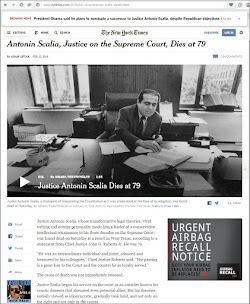 (Feb. 15, 2016 07:25 ET)–There were several issues created when Justice Antonin Scalia died Saturday. Mainstream media reports for the most part focused on how the GOP would interfere with any nominee submitted by President Obama being that this is his last year in office.
(Feb. 15, 2016 07:25 ET)–There were several issues created when Justice Antonin Scalia died Saturday. Mainstream media reports for the most part focused on how the GOP would interfere with any nominee submitted by President Obama being that this is his last year in office.
Then there were the reports that mentioned President Obama’s intention to not delay moving forward with nominating a replacement.
Eventually, the reporting broke away from that rut, broadening into more substantive areas such as; 1) what the usual length of time was for nominations to be confirmed; and 2) what was the history of nominees submitted during the last year of a presidents term.
Below is a breakdown prepared by The New York Times which begins to address the first question regarding the length of time to confirm. The other question, regarding the practice and history of last year nominations, was not fully discussed, “. . . few presidents have successfully filled vacancies announced in their final full year.”
Related Articles:
How Long Does it Take to Confirm a Supreme Court Nominee? (Feb. 13, 2016), The New York Times



